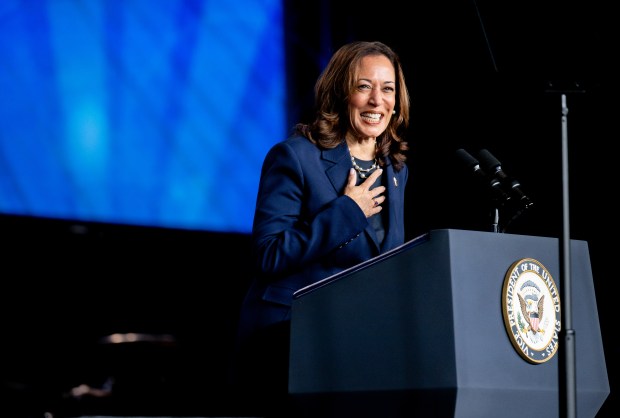A couple things happened after Donald Trump bragged about grabbing women by their genitalia and still got elected to the presidency.
One, it helped launch the Women’s March, with more than 3 million men, women and children flooding the streets of towns and cities across the nation on Jan. 21, 2017—the largest single-day protest in U.S. history, which has since evolved into a Super PAC.
Two, it taught a whole bunch of people they could say whatever they want about women in this country and their side would still win — elections, ratings, page views, downloads.
The former may seem like a rebuke to the latter, but it didn’t force everyone to throw out the 2016 playbook.
“Kamala Harris, she’s the original ‘Hawk Tuah’ girl,” pundit Alec Lace said on Fox Business in early July. “That’s the way she got where she is; and the party’s going downhill if it’s in her hands.”
Lace’s comments were a particularly egregious display of sexism, vulgarity and revisionist history, but they were par for the course when coarse is your currency. Discredit her by debasing her — even if you debase yourself in the process.
I don’t think it will work this time.
Not because the country spent the past eight years exorcizing our demons. Hardly. If one-half of your two-party system is spouting childless-cat-lady, DEI-hire, sleep-your-way-to-the-top talking points even as it rolls back reproductive rights, your sexism is showing.
I don’t think it will work this time because I think Trump’s presidency helped us connect the dots between malice toward women and a brutishness toward humanity; between disrespect for women’s autonomy and a disregard for a nation’s authority.
Not every sexist also mocks disabled people and name calls opponents and demonizes immigrants and incites a coup attempt and gets convicted of 34 felony counts. But Trump did. And while a sizable portion of the country may be ready to put that all behind us, a sizable portion appears not to be.
A Win With Black Women call drew 44,000 people to Zoom in late July. A three-hour White Dudes for Harris Zoom just pulled in more than 180,000 people and $3.7 million. A few nights earlier, more than 160,000 people joined “White Women: Answer The Call! Show up for Kamala Harris” and promptly broke Zoom.
In the 48 hours after President Joe Biden endorsed Harris, close to 40,000 people registered to vote, according to Vote.org — the largest number of registrations in a 48-hour period this election cycle. People aged 18 to 34 made up 83% of the new voter registrations.
A Morning Consult poll of 11,538 registered voters between July 26 and 28 found that Harris is more popular now than Joe Biden or Donald Trump were at any point in the 2024 election cycle.
Will all of this translate to a Harris victory in November? Hard to say. Polls can mislead. Energy can wane.
And there’s this: A July 28 Wall Street Journal story reports that a majority of men under 30 support Trump, after backing Biden in 2020.
“If that holds until Election Day,” the Journal reports, “Republicans would win young men for the first time in more than two decades, voter exit polls show.”
It’s important to note, however, that those polls were taken when Biden was still in the race.
“The question now,” the Journal reports, “is whether Harris, the expected Democratic nominee, will recapture the support of young men or push more of them away.”
The story goes on to cite recent data from the nonpartisan Pew Research Center.
“An April survey by the Pew Research Center,” the Journal reports, “found that 23% of men — and 33% of men who backed Trump — believed the advancement of women has come at their expense.”
But that means most of them … don’t.
“Biden and Trump voters differ sharply over the state of women’s progress in the U.S., as well as over whether society should prioritize marriage and children,” the original Pew report reads. “Yet majorities of both candidates’ supporters say that the gains women have made in society have not come at the expense of men.”
The more we lean into and build on that, the more we resist pitting men against women and women against men, the better we understand that a battle of the sexes is one that nobody wins, the faster we accept — and celebrate — that all of our fates are intertwined, that companies and governments and communities and families are healthiest when everyone gets a seat at the table, the better we’ll all be.
The advancement of any of us shouldn’t come at the expense of the rest of us. We’re better and stronger and smarter when we invite — and honor — a diversity of ideas and thoughts and experiences and hopes and worries and challenges and dreams and questions and answers.
I don’t know what will happen in November. But the path that’s taking us there feels uncharted, unconventional, unprecedented. And already, that’s hopeful. Already, that feels like the old rules no longer apply.
Join the Heidi Stevens Balancing Act Facebook group, where she continues the conversation around her columns and hosts occasional live chats.
Twitter @heidistevens13




